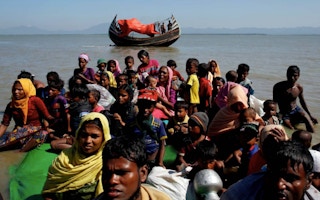Rohingya who sought refuge in Bangladesh are boarding boats to Indonesia. But with a new destination comes new challenges.
For seven years, Rohingya muslims have been fleeing Myanmar, victims of persecution by the Buddhist-majority government.
As we mark World Refugee Day on June 20, more than 1 million Rohingya languish in squalid, violence-plagued camps around Cox’s Bazar in Bangladesh. Many have been there for years.
Desperate to escape life in the camps, an increasing number — many of them women and children — are putting their fates into the hands of people smugglers who cram them onto boats bound for Indonesia.
But a new country does not necessarily guarantee a better life.
Not only is the sea voyage perilous, Indonesia is not properly equipped for the arrivals. Most Rohingya end up in Aceh province, one of Indonesia’s poorest regions, where they not only face hostility from locals, but more uncertainty about their future.
Refugees often face discrimination such as poor access to healthcare, education and employment, as the region is already struggling with various social issues of its own, such as poverty and food insecurity.
Psychological distress and trauma, starvation and gastritis, and untreated infections, among other health conditions, are commonly found among the Rohingya refugees in Aceh, according to a recent health checkup supported by the International Organization for Migration (IOM) in Indonesia.
A life in limbo
The refugees exist in a “state of limbo” where their conditions are often neglected, overlooked within current refugee and migration frameworks and, at worst, forgotten. This situation, if not addressed, can further exacerbate their vulnerabilities, such as deteriorating health, particularly for women and girls.
The way in which refugees are incorporated and housed differs across the world, mainly depending on the host country’s signatory status to the 1951 Refugee Convention and the wealth of the host country.
Bangladesh is a non-signatory to the convention, so when the influx of Rohingya began in earnest in 2017, the UN Refugee Agency (UNHCR) opened ‘Transit Centres’, where refugees could receive temporary housing, immediate healthcare, vaccinations and food.
Similarly, Indonesia, also a non-signatory to the convention, tolerates temporary transit of refugees and allows humanitarian assistance from UNHCR and IOM.
However, neither country has a formal system for permanent resettlement and instead places restrictions on refugee legal rights, including their access to employment. Currently, Indonesia hosts more than 14,000 people registered with UNHCR, more than half of them women and children.
Refugee women and girls are highly dependent on insufficient humanitarian aid. As they are denied access to income and livelihoods, the inequities and precarious housing and living conditions have profound implications.
A recent study found that female refugees face far greater risk of gender-based violence, exploitation in the form of modern slavery and sex trafficking, have poor access to sexual and reproductive health and rights and increased mental health issues, including thoughts of suicide.
The UN Population Fund (UNFPA) reported that the funding gap for refugee camps in Cox’s Bazar may lead to desperate survival strategies such as forced early marriage. Recent studies also highlight that these impacts were further exacerbated during the Covid-19 pandemic.
A challenge to Indonesia’s health system
The arrival of Rohingya refugees in Indonesia presents a critical challenge to healthcare systems. However, if the challenge is left unaddressed, displaced populations could become a significant strain on already overburdened national health systems, particularly during pandemic situations.
Hence, there is both a moral and practical urgency to better recognise and integrate this highly vulnerable group of migrants into universal health coverage, while also improving the quality of public health services for their host communities.
While there is some evidence of how universal health coverage considers refugees in Europe, there is little insight on its effect in Asia. While Indonesia, Malaysia, Myanmar and Thailand have made some progress towards universal health coverage through social health insurance, it largely remains inaccessible to refugees for several reasons.
It is unaffordable because refugees have no right to work. There are also no national policies that recognise refugees’ documentation issued by the UNHCR.
This highlights the importance of recognising this highly vulnerable group as part of regional public health issues to be addressed, which would amplify public awareness and ongoing advocacy efforts to include refugees in the national health insurance system.
A system to benefit everyone
Research with affected communities can help identify best practices that would complement the goals of universal health coverage.
A research project by Monash University, Indonesia, in partnership with Sisterhood, a refugee women-led organisation, is designing and producing innovative and inclusive health interventions to benefit both the host community and transit refugees in the greater Jakarta region.
Identifying best practices can promote evidence-based policy that benefits both refugees and host communities.
For example, UNFPA highlights the significant role of midwives have in supporting safe birth deliveries in the Rohingya refugee camp in Cox’s Bazar, aligning with the cultural norms of the population. Allowing Rohingya women to work alongside the Bangladeshi midwives not only nurtures social harmony but also opens livelihood opportunities for refugee women in the camp.
Asean member states have committed to achieving universal health coverage by 2030, and this commitment needs to be expanded to include refugees. The role of civil societies, human rights groups and other non-government stakeholders are important to ensure that Asean member countries’ commitment to universal health care stays true to its fundamental principle: essential and quality affordable health services for all.
This piece is co-authored with Anak Agung Istri Diah Tricesaria, a PhD candidate and Herb Feith Scholar at School of Social Sciences, Faculty of Arts, Monash University, Australia. Diah’s research expertise is in women’s experience in forced migration, the praxis of humanitarian and development aid, human rights and decolonisation of the Global South.
Dr Sabina Satriyani Puspita is deputy director of Monash Herb Feith Indonesian Engagement Centre and assistant professor at Monash University, Indonesia. Sabina’s research interests include democratisation, gender politics, and sustainable communities in Northeast and Southeast Asia.
Dr Gabriela Fernando is an assistant professor at Monash University, Indonesia. Her key research interests focus on the intersection of women’s health and poverty indicators, particularly concerning vulnerable populations across South and Southeast Asia.
Originally published under Creative Commons by 360info™.












